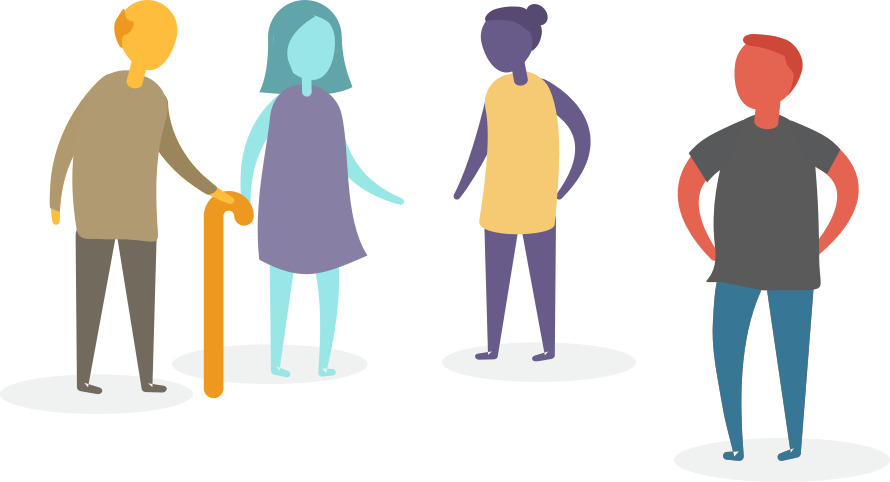Mental
Well-being
Mental well-being
Living with chronic kidney disease (CKD), or caring for someone with CKD, can affect your mental well-being.
You can have feelings of anxiety, fear, denial, sadness, anger, and stress. Living with the seriousness of CKD can lead to a more negative view of life and leave you feeling down.
CKD can affect your personal life. You might find yourself making lifestyle changes because you feel you have no choice. Living with CKD might mean having to cancel plans with friends when you are not feeling well. As a result, you may end up spending more time alone.
Depression and kidney disease
It can be common for people with CKD to experience depression. Depression is a state of mind where things that used to make you happy do not anymore. You may feel hopeless and helpless. You may sleep or eat more or less than usual. Crying a lot, having little energy, feeling worthless, weight changes, and not wanting to live are other signs of depression.
Depression can affect anyone, regardless of gender, age, background, or general health. The important thing to remember is that depression can be effectively treated.
How can I talk to others about my mental well-being?
It can be difficult to talk to people about how you feel when living with CKD. Learning about CKD will help you and your family understand more about what to expect and feel more in control.
Talking to your family, peers, friends, or health care providers, such as a social worker, can provide you with emotional support, practical suggestions, and resources.
 You are not alone in your journey with CKD
You are not alone in your journey with CKD
Joining a support group is a great way to talk to others and help manage your mental health. Discussing your symptoms and tips for dealing with them in a relaxed, understanding environment can be a great support. The Kidney Foundation of Canada hosts an online support community, Kidney Connect, and offers peer support by telephone: 1-866-390-PEER (7337).
Be open about how you feel, and let your family, friends, peers, and your health care providers know what they can do to help.
Talking to children
It is important to discuss your condition openly with your children, at a level they can understand. Do this in a clear, age-appropriate way so that they do not develop fears or wrong ideas about what is going on.
Children may behave differently after they learn about your diagnosis. They may begin to act more mature, or they may begin to misbehave. These behaviors are ways that they may try to cope with your condition. If you are concerned about how your child might be dealing with your diagnosis, you may want to discuss this with your child’s health care provider.
Coping Strategies
It is important to find strategies to help you cope. The following tips and resources may help you manage your mental well-being:
- Talk and share your feelings: Find someone you trust and talk to them. Do not be afraid to tell others how you are feeling, and to ask for help and support when needed.
- Connect with peers: It can be helpful to talk about your feelings with others who have CKD. Peers understand what you are going through and can offer support.
- Try to take charge: Living with CKD or caring for someone with CKD does not mean you should give up on your goals and dreams. You may need to change how you accomplish them. Move towards goals one small step at a time.
- Try to stay active: Small amounts of exercise, such as brief walks outside, can help you feel better.
Resources
- Dealing with Depression
A resource from the Kidney Foundation of Canada with helpful tips to help you identify and manage depression, and guidance on what to do if things do not improve. - Kidney Connect
An online social network hosted by the Kidney Foundation of Canada. Kidney Connect is available in English and French, features live chat, forums, blogs, support groups, and events. The program is available for anyone affected by kidney disease (including friends, caregivers, and kidney donors). - Kidney Disease Peer Support line: 1-866-390-PEER (7337)
The peer support line, offered through the Kidney Foundation of Canada, connects people affected by kidney disease with people who have experienced kidney disease first-hand. While they do not offer medical advice, they can answer many questions about their experiences and how they have coped with CKD. - Canadian Mental Health Association (CMHA)
Information and helpful printable brochures about managing anxiety (for adults and children), care for the caregiver, depression, coping with loneliness, substance use, anger, and how to get help. Includes an interactive map tool to help you Find Local CMHA clinics and resources in Canada.

